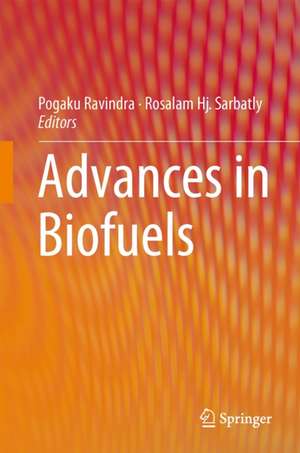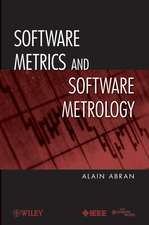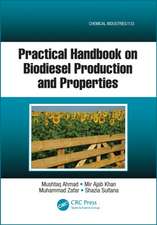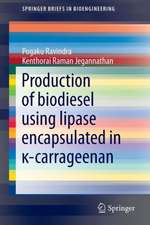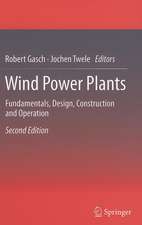Advances in Biofuels
Editat de Pogaku Ravindra, Rosalam Hj. Sarbatlyen Limba Engleză Hardback – 2 mar 2013
| Toate formatele și edițiile | Preț | Express |
|---|---|---|
| Paperback (1) | 640.06 lei 43-57 zile | |
| Springer Us – 8 feb 2015 | 640.06 lei 43-57 zile | |
| Hardback (1) | 644.95 lei 43-57 zile | |
| Springer Us – 2 mar 2013 | 644.95 lei 43-57 zile |
Preț: 644.95 lei
Preț vechi: 758.77 lei
-15% Nou
Puncte Express: 967
Preț estimativ în valută:
123.41€ • 129.18$ • 102.72£
123.41€ • 129.18$ • 102.72£
Carte tipărită la comandă
Livrare economică 31 martie-14 aprilie
Preluare comenzi: 021 569.72.76
Specificații
ISBN-13: 9781461462484
ISBN-10: 1461462487
Pagini: 288
Ilustrații: XX, 268 p.
Dimensiuni: 155 x 235 x 21 mm
Greutate: 0.54 kg
Ediția:2013
Editura: Springer Us
Colecția Springer
Locul publicării:New York, NY, United States
ISBN-10: 1461462487
Pagini: 288
Ilustrații: XX, 268 p.
Dimensiuni: 155 x 235 x 21 mm
Greutate: 0.54 kg
Ediția:2013
Editura: Springer Us
Colecția Springer
Locul publicării:New York, NY, United States
Public țintă
GraduateCuprins
Prospect, Challenges and Opportunities on Biofuels in Malaysia.- Investment Opportunities at Palm Oil Industrial Cluster (POIC) Lahad Datu with Special Reference to Biofuels.- Biomass Conversion to Fuel (Solid, Liquid and Gas Fuel) .- On-line Mass Spectrometric Analysis of Sulfur Compounds From Hydrothermal Reactions of Biomass Wastes for Hydrogen Production.- Utilization of Oil Palm Wastes for Biofuel and Other Added Bioproducts: A Holistic Approach to Sustainable Waste Management for the Oil Palm Industry.- In-situ Spectroscopic Monitoring of Straight Vegetable Oils Combustion Properties (Sunflower and Soybean Oils) .- Low Cost Alternative Renewable Energy Bioethanol Production Palm Oil in Malaysian Context.- A bio- route production of biodiesel.- Catalysis in Biodiesel Synthesis: Challenges and Future Perspectives.- Higher Grade Biodiesel Production by Using Solid Heterogeneous Catalysts.- Enzymatic Process for Biodiesel And High Value Added Products.- Stability studies of immobilized Burkholderia cepacia lipase and its application in biodiesel production from Jatropha curcas oil.- Fermentation Study on Macroalgae Eucheuma Cottonii for Bioethanol Production via Varying Acid Hydrolysis.- Membrane Photobioreactor as a Device to Increase CO2 Mitigation by Microalgae
Notă biografică
Dr.Pogaku Ravindra Professor of Chemical and Bioprocess Engineering Postgraduate coordinator School of Engineering and Information Technology University Malaysia Sabah (UMS) Kota Kinabalu, Sabah, Malaysia. Rosalam Hj.Sarbatly, Ph.D Dean/Assoc.Prof. School Of Engineering and Information Technology, University Malaysia Sabah
Textul de pe ultima copertă
Biofuels will play a key role in the 21st century as the world faces two critical problems; volatile fuel prices and global climatic changes. Both of these are linked to the overdependence on the fossil fuels: petroleum, natural gas, and coal. Transportation is almost totally dependent on petroleum based fuels such as gasoline, diesel fuel, liquefied petroleum gas, and on natural gas. Despite a significant amount of research into biofuels, the field has not been able to replace fossil fuels. Recent advances will change this scenario. Extracting fuel from biomass has been very expensive (both monetarily and in land usage), time consuming, unusable byproducts, etc. Technology to obtain liquid fuel from non-fossil sources must be improved to be faster, more efficient and more cost-effective. This book will cover the current technology used for a variety of plant types and explore shortcomings with each.
Caracteristici
Timely publication about energy and the environment Displays improved techniques for extracting energy from biomass (cheaper, more efficient, less, waste) Written for students but suitable for the interested lay reader
